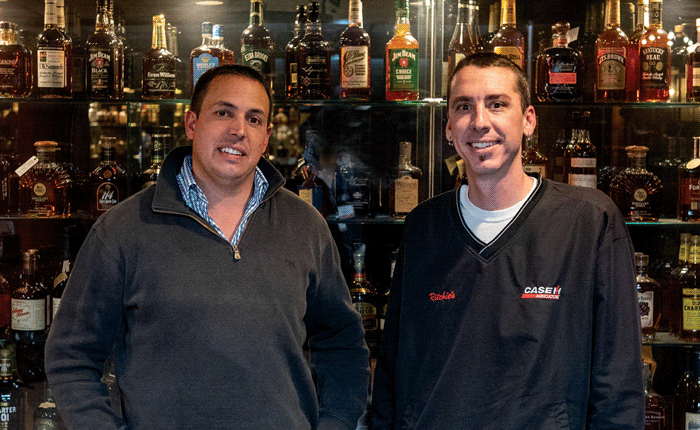Jason McNeice
Precision Farming Specialist,
Wideland Ag & Construction, Queensland, Australia
Kevin Depies
Sales & Management,
Ritchie Implement, Cobb, Wis.
Pictured Above: Sitting down at the 2018 Precision Farming Dealer Summit, Jason McNeice (left) and Kevin Depies (right) had plenty of banter to bridge the 9,000-mile gap between their Case IH dealerships, from climate challenges to getting compensated for service visits.
Jason McNeice: I was one of the early guys brought on board when the dealership started 5 years ago. Funny story, I’d leased some machinery from the dealership and there were a few maintenance issues, so I came back and said, “These things need fixing before I lease it out next time.” And they asked if I wanted a job selling GPS stuff. I thought, no way. I’m no salesman. I can’t sell stuff, so I turned them down, but I took an apprenticeship with the dealership. So at 30 years old, I enrolled in a diesel mechanic trade program, and did it in 22 months. By the time I’d finished I was already doing this job and I’m really enjoying what I’m doing now.
Kevin Depies: That’s similar to my story. I went to a 4-year school and knew the dealer principals on a personal level. At the time, I didn’t plan on applying for a job there because I didn’t think there was an opening that fit me. So I went to work at a manufacturing-type position, which turned out to be a nightmare. I lasted 6 weeks before I quit. Then one night talking at the bar with some people, I heard about this job in precision farming and quickly applied. It turned out to be the best thing I ever did.
McNeice: The rest is history. It seems like it’s a good fit for you also.
Depies: Absolutely. One of our biggest struggles is that we’re not always busy year-round with our precision farming guys. Planting season from March though May is hectic, but in June it slows down a bit until August when combine season begins to take off. In the early stages of planting season, our precision specialist does sales, basic installs and primarily calibrations. Our shops take care of the major installs, but when it comes time to pull equipment into the field, our precision specialist is out there making sure everything clicks.
McNeice: Do you get the mechanics to do much? Installs maybe? How do you guys work with the service and the precision side?
Depies: We’ve got a 196-piece tool set, which isn’t much in the grand scope of things. As soon as the job requires anything beyond a three quarter-inch wrench, we utilize the shop, which also helps to maximize the hours of our traveling technicians. Most of those installs don’t fall in the middle of planting season or harvesting season, so our shop isn’t getting jammed up. It works well sharing the load. And I’ll call it good revenue generating time vs. shop and lot time. I don’t know if you’re aware of that term, but it’s unbillable.
McNeice: The way we deal with it is seasonal and based on how much work there is. Because we have such a long drive between farms and dealerships, the first person to get there tries to sort it all out. I like the idea of that 196-piece tool set because we take on too much. We’re investing a lot of expertise and training into these technicians and need to protect them from burnout.
Depies: Do you do a lot of maintenance on-farm, or is a lot brought into the dealership?
McNeice: We do 99% on-farm. It’s a mirror of what our shops do. They’ll only bring something into the shop if it’s a transmission or engine rebuild. We do tend to pick the particular farms we go to, but travel is a big challenge for us. And billing that travel is not only expensive, but it’s also hard to justify in all cases because most of our customers are at least an hour’s drive.
Depies: And do you bill the customer that hour of travel time both ways? You have to, right?
McNeice: We do. And that’s why we try to carry all the tools that we need, so that we can finish the job with the one trip. We have a per-kilometer charge and a time charge for the travel. We also have a shop rate and a field rate. Our rates are ranked differently for the experience of the technician, so some apprentices will be on a low to medium rate. They’ll finish their trade and suddenly they are able to charge more based on their experience. It elevates again if they get to be a master technician. It’s not just about trying to recoup un-clocked time, but it’s also about the training and investment we put into our people.
Depies: Do you charge for the phone support you provide within a 50-mile radius? That must be a lot of calls.
McNeice: We’d like to and need to, but it’s difficult because when I’m on the road, I can’t accurately note the exact issue or duration of the call. I just try to help customers and get 2 jobs done at the same time. I’m taking upward of 100 calls a day sometimes.
Depies: When it slows down, do you get a decent breather where you’re down to 15 or 20 calls a day, or are you always that busy?
McNeice: We actually farm all year round. So there is no down time. The last time we had a slow week was November 2016.








Post a comment
Report Abusive Comment